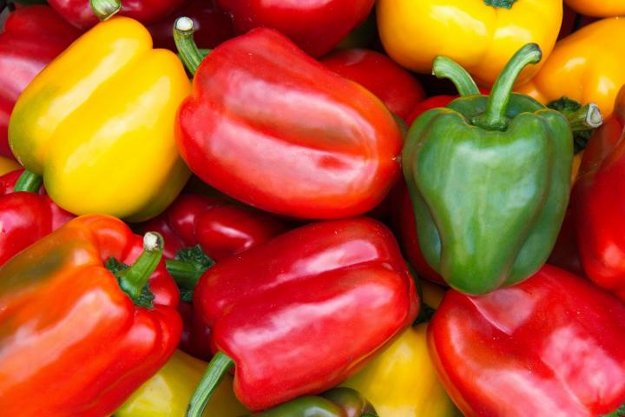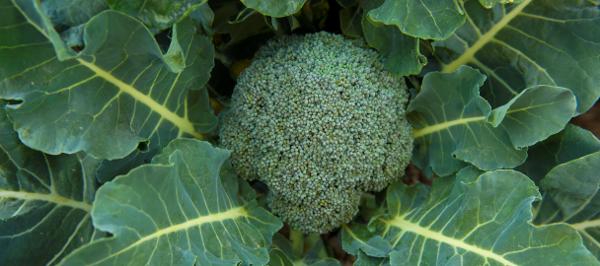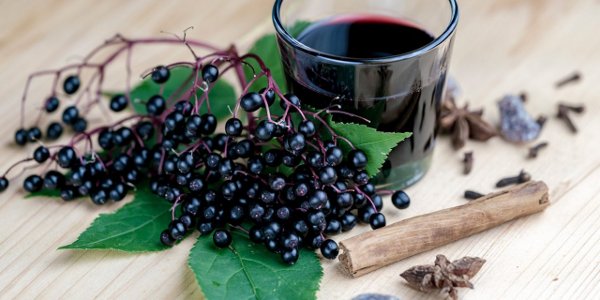The Medicinal Herb Info site was created to help educate visitors about the often forgotten wisdom of the old ways of treating illnesses. Many of today's drugs and medicines were originally derived from natural ingredients, combinations of plants and other items found in nature.
We are not suggesting that you ignore the help of trained medical professionals, simply that you have additional options available for treating illnesses. Often the most effective treatment involves a responsible blend of both modern and traditional treatments.
We wish you peace and health!
|

This time of year, we are inundated with images of the humble pumpkin. It’s a lovely gourd / vegetable / berry. (Seriously, a berry!) People use it to carve into Halloween decorations, make tasty pies, cakes, cookies and even flavor coffee. But there’s much more to the pumpkin than all of that. It may even help diabetics control their glycemic levels.
The materials inside pumpkins such as the fruit pulp, oil from ungerminated seeds, and protein from germinated seeds have hypoglycemic properties. These biologically active ingredients—polysaccharides, para-aminobenzoic acid, vegetable oils, sterol, proteins, and peptides—could assist in maintaining healthy blood sugar levels, researchers suspect.
Gary Adams from the School of Health Sciences at the University of Nottingham is investigating the effect these ingredients have on blood sugar and diabetes, “There are many different types of insulins available to treat diabetes, but there are still physiological consequences for such use. Alternatives are, therefore, required and this includes herbal preparations as well as dietary plants in the form of curcubitaceae (pumpkin).”
The chemical process involved is quite complex, but you can read all about it in the research paper from Critical Reviews in Food Science and Nutrition.
I wouldn’t expect that it would be healthy to eat tons of pumpkin foods, just for this benefit, but having a bit of pumpkin in your diet might be a great addition for more than its taste. If the research continues, we may see diabetic treatments that are derived from pumpkins in the near future. Stay tuned.
To learn more about pumpkin health benefits check out the full page about Pumpkins and hear a podcast interview with the author of a book about pumpkins from one of my favority podcasts, Ologies, see this earlier post from this site.
Futurity: Can Pumpkins Ward Off Diabetes?
University of Nottingham: Pumpkins can ward off more than evil spirits
Critical Reviews in Food Science and Nutrition: The Hypoglycemic Effect of Pumpkin Seeds, Trigonelline (TRG), Nicotinic Acid (NA), and D-Chiroinositol (DCI) in Controlling Glycemic Levels in Diabetes Mellitus

Research is proving what many cultures have known for centuries about improving health with certain additions to the diet. Recent studies have shown that adding fermented foods to the diet has a number of health benefits, including improving gut bacteria and reducing inflammation.
Science tells us that the body’s immune system is closely tied to its healthy gut microbiome. When there is a lack of healthy gut bacteria, the immune system is damaged. That’s why we hear so much about taking pro- and pre-biotics. However, recently scientists are discovering that the best way to improve the gut microbiome is by adding some fermented foods to our diet.
Fermented foods are often plant-based foods such as:
- Kimchi – a traditionally Korean fermented vegetable dish
- Sauerkraut – a traditional German dish made from fermented cabbage
- Kombucha – a tangy, bubbly drink made from fermenting green tea or black tea
- Tempeh – a fermented soy product that’s a popular vegetarian meat replacement
(Non-plant-based options are things like yoghurt and kefir.)
The more I learned about these fermented foods, the more excited I got. So I created this full page with information about them, including recipes for you to use to make them at home.
Futurity: Fermented Food Diet Boosts Microbiome and Cuts Inflammation
Stanford University: A fermented-food diet increases microbiome diversity and lowers inflammation, Stanford study finds
Cell.com: Gut-microbiota-targeted diets modulate human immune status
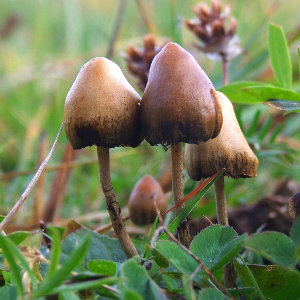 A lot has been reported lately about the potential for Psilocybin Mushrooms to help treat major depression. Multiple universities worldwide have been doing research studies into the effects of psilocybin on people with prolonged and profound depression. They have been discovering some amazing things about it. A lot has been reported lately about the potential for Psilocybin Mushrooms to help treat major depression. Multiple universities worldwide have been doing research studies into the effects of psilocybin on people with prolonged and profound depression. They have been discovering some amazing things about it.
In a controlled, clinical environment, under careful supervision, researchers have administered psilocybin to people with devere depression and have found that it not only increases the person’s sense of wellbeing, but it reduces depression and has long-lasting effects. They even see that it seems to “rewire the brain’s neurons.”
If this proves to be true, major depression may become much more treatable. Of course, in many countries, the use of psilocybin is still illegal, so for the present time, anyone wishing to try psilocybin for depression should contact a research study using it, or travel to a country/location where it is legal.
The research so far looks very exciting and it should be interesting to see how the study progresses and what it discovers. If you want to learn more about Psilocybin Mushrooms, check out the full page I have added to this site. (It also includes links to resources that provide instructions and warnings for people interested in trying them.) I am also offering you this extensive list of links to research studies and other relevant information:
Futurity: ‘Magic Mushroom’ Drug May Repair Neural Links Depression Cuts
Yale University: Psychedelic spurs growth of neural connections lost in depression
Futurity: Stuff in ‘Magic Mushrooms’ Could Treat Major Depression
Johns Hopkins University: Psychedelic Treatment with Psilocybin Relieves Major Depression, Study Shows
Johns Hopkins Launches Center for Psychedelic Research
Journal of Pharmacology: Psilocybin produces substantial and sustained decreases in depression and anxiety in patients with life-threatening cancer: A randomized double-blind trial
Journal of Pharmacology: Survey study of challenging experiences after ingesting psilocybin mushrooms: Acute and enduring positive and negative consequences
Johns Hopkins University: Psychedelic Drug Psilocybin Tamps Down Brain’s Ego Center
Johns Hopkins University: Research Story Tip:What Motivates People To Use Psychedelics? New Criteria May Help Provide the Answer
Johns Hopkins University: Psychedelic Treatment with Psilocybin Shown to Relieve Major Depression
Johns Hopkins University: Researchers Urge Caution Around Psilocybin Use
Johns Hopkins University: Tapping into Psilocybin’s Potential
Wikipedia: Psilocybin mushroom
Johns Hopdins University: ‘Magic Mushrooms’ Help Longtime Smokers Quit
Johns Hopkins University: Hopkins Scientists Show Hallucinogen in Mushrooms Creates Universal ‘Mystical Experience’
Johns Hopkins University: Single Dose of Hallucinogen May Create Lasting Personality Change
Neuron Magazine: Psilocybin induces rapid and persistent growth of dendritic spines in frontal cortex in vivo
Wikipedia: Psilocybin
Newsweek: Magic Mushrooms Guide: Where Shrooms Are Legal and How To Take Psilocybin
The Guardian: ‘They broke my mental shackles’: could magic mushrooms be the answer to depression?
The Guardian: Magic mushrooms lift severe depression in clinical trial
The Lancet: Psilocybin with psychological support for treatment-resistant depression: an open-label feasibility study
The Guardian: Magic mushrooms ‘reboot’ brain in depressed people – study
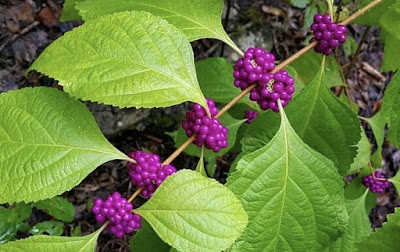
There’s a very useful plant that may be found near your home that can help with a number of health issues. It’s a pretty plant that grows in woods and thickets all across Southern North America. In fact, it’s often used as an ornamental plant. This plant is the American Beautyberry.
One of the world’s most dangerous beings is the common mosquito. The bites of these creatures spread numerous, sometimes life-threatening diseases worldwide in addition to being just plain annoying. And hikers know that ticks carry a number of nasty diseases too, for example Lyme Disease. Studies have shown that applying Beautyberry to the skin or to clothing is an effective deterrent for mosquito and tick bites. This seems like a much better option than using toxic chemicals found in over-the-counter bug repellants. Check out the full page on Beautyberry on this site for two recipes for making your own bug repellant using Beautyberry.
But that’s not all this plant has to offer us. Recent research studies have also shown that a compound in beautyberry leaves is able to boost the effectiveness of antibiotics in treatment of methicillin-resistant Staphylococcus aureus, or MRSA. Once again, the plants around us are more than just lovely decorations.
Externally, the bark and stems were used to treat itchy skin. The berries are edible and the roots are useful, offering a number of health benefits..
For a lot more information and a recipe for making Beautyberry jelly, be sure to check out the full page on Beautyberry on this site.
Futurity: Beautyberry Compund Aids Antibiotic Against MRSA
Emory University: Beautyberry leaf extract restores drug’s power to fight ‘superbug’
Plants for a Future: Callicarpa americana – L.
Beautyberries’ powers go beyond good looks
Foraging Texas: American Beautyberry
Weeds and Deeds: American Beautyberry
This one came as a huge surprise to me. Not the fact that eating peppers is good for us, but the reason why eating peppers could help prevent the onset of Parkinson’s disease. The key is nicotine.
Crazy, right? For years, we’ve been told how terrible nicotine is for us, but it might actually have some benefit, if eaten in foods rather than taken in as a chain-smoker.
Interestingly, peppers are a member of the same botanical family as tobacco and contain small amounts of nicotine as a result. Research studies have shown that people who eat peppers (it really doesn’t specify which variety) at least twice per week have a much lower instance of contracting Parkinson’s disease.
Researchers at the University of Washington studied this phenomenon and published their findings in the Annals of Neurology. Go read about it and see how they made this conclusion. Of course, they still plan to do more studies to confirm the results, but hey, it’s a great excuse to eat a delicious vegetable, just in case.
As a person that was raised by two chain-smoking parents, I detest the idea of my starting to smoke just to potentially avoid Parkinson’s. I don’t recommend you doing it either. Stick to eating yummy peppers instead.
Also, be sure to check out the full page of information about Cayenne peppers to learn more about their medicinal benefits.
Futurity: Can Eating Peppers Help Prevent Parkinson’s?
Nicotine from edible Solanaceae and risk of Parkinson disease
University of Washington: Do peppers reduce risk of Parkinson’s?
Scientists at Emory University took on the study of some medicinal plants cited in a Civil War era medical guide to see if they actually are effective in treating some infections. The guide, Resources of the Southern Fields and Forests, Medical, Economical, and Agricultural; Being Also a Medical Botany of the Confederate States, by Francis Peyre Porcher, listed the Devil’s Walking Stick, White Oak and Tulip Poplar as having the ability to fight infections in soldiers.
Since surprisingly, more soldiers died from infection than from Civil War battles themselves, fighting infections was of the utmost importance. So naming these three plants as having antiseptic properties was definitely a big deal of the time. The good news is that Emory’s study of them shows that there’s some validity to their use in fighting infections and more study could show that extracts from them could help us fight drug-resistant bacteria today.
Futurity: The results show that extracts from the plants—the white oak, the tulip poplar, and the devil’s walking stick—have antimicrobial activity against one or more of a trio of dangerous species of multi-drug-resistant bacteria associated with wound infections: Acinetobacter baumannii, Staphylococcus aureus, and Klebsiella pneumoniae.
“Our findings suggest that the use of these topical therapies may have saved some limbs, and maybe even lives, during the Civil War,” says senior author Cassandra Quave, assistant professor at the Center for the Study of Human Health and the School of Medicine’s dermatology department at Emory University.
“Our research might one day benefit modern wound care, if we can identify which compounds are responsible for the antimicrobial activity,” says Micah Dettweiler, the first author of the paper in Scientific Reports.
You can read more about this fascinating study by following the links below. Also, be sure to check out the full pages about these plants and their medicinal uses
Futurity: 3 Plants from U.S. Civil War Medical Guide Fight Infection
Emory University: Civil War plant medicines blast drug-resistant bacteria
Nature.com: American Civil War plant medicines inhibit growth, biofilm formation, and quorum sensing by multidrug-resistant bacteria
 Resources of the Southern Fields and Forests, Medical, Economical, and Agricultural; Being Also a Medical Botany of the Confederate States, by Francis Peyre Porcher Resources of the Southern Fields and Forests, Medical, Economical, and Agricultural; Being Also a Medical Botany of the Confederate States, by Francis Peyre Porcher
You may not think of broccoli as a medicinal herb, but read on to find out why it should definitely be included in this category. Recently, there has been a multitude of scientific research into the cancer-fighting potential of broccoli. It seems that a vegetable we have been encouraged to eat all our lives may hold special potential to keep us healthy. Here are some of the recent findings from research studies that show broccoli’s cancer-fighting potential.
Broccoli sprout extract may keep cancer from returning.
Potent doses of broccoli sprout extract activate a “detoxification” gene and may help prevent cancer recurrence in survivors of head and neck cancer, according to new research at the University of Pittsburgh.
Colon cancer is more easily killed by a drug that includes broccoli component.
Colon cancer cells were more likely to die when they were pretreated with sulforaphane, an ingredient found in broccoli, and then treated with a cancer drug currently in development. The concentration used was equivalent to eating a typical serving of broccoli, according to a study at The Swiss National Science Foundation.
A new drug made from broccoli and other plants may help fight breast cancer.
Luteolin, a natural compound found in herbs such as broccoli, may reduce the cancer risk for women who have taken hormone replacement therapy, accroding to a recent study at University of Missouri.
Mouth cancer might be effectively prevented by including broccoli sprout extract in the diet.
Research showing the potential to prevent mouth cancer and other head and neck cancers using broccoli sprout extract has been very promising. Researchers from the University of Pittsburgh and Johns Hopkins University collaborated on the study, which was announced recently at the American Association for Cancer Research Annual Meeting in Philadelphia.
Prostate cancer might be treated effectively with a compound found in broccoli.
Research at the Texas A&M Health Science Center Institute of Biosciences and Technology has been studying whether a compound known as sulforaphane, which occurs naturally in broccoli, could be used to treat advanced prostate cancer, with very promising results.
A broccoli component, selenium, may fight melanoma, prostate cancer, and leukemia.
The mineral selenium, which naturally occurs in foods like broccoli and garlic, appears to slow down a process that allows cancers such as melanoma, prostate cancer, and leukemia to spread, according to research at University of Copenhagen.
So your mom was right…Eat your broccoli! And be sure to check out the full page of information about Broccoli to learn much more about this important plant.
Futurity: Broccoli Sprout Extract May Block Cancer’s Return
University of Pittsburgh: Broccoli Sprout Extract May Protect Against Oral Cancer Recurrence
Prevention of Carcinogen-Induced Oral Cancer by Sulforaphane
Futurity: Stuff in Broccoli Helps Drug Kill Colon Cancer
Broccoli ingredient has positive influence on drug efficacy
Sulforaphane Preconditioning Sensitizes Human Colon Cancer Cells towards the Bioreductive Anticancer Prodrug PR-104A
Futurity: Drug Made from Herbs May Fight Breast Cancer
University of Missouri: Natural Compound Found in Herbs, Vegetables Could Reduce Breast Cancer Risk in Some Women
Luteolin inhibits progestin-dependent angiogenesis, stem cell-like characteristics, and growth of human breast cancer xenografts
Futurity: Broccoli Sprout Extract May Prevent Mouth Cancer
Futurity: This Broccoli Compound May Treat Prostate Cancer
SUV39H1/H3K9me3 attenuates sulforaphane-induced apoptotic signaling in PC3 prostate cancer cells
Texas A&M University: Chemical Found in Broccoli May Offer a New Option for Treating Advanced Prostate Cancer
Futurity: How Selenium in Broccoli May Fight Melanoma
The Selenium Metabolite Methylselenol Regulates the Expression of Ligands That Trigger Immune Activation through the Lymphocyte Receptor NKG2D
University of Copenhagen: Selenium compounds boost immune system to fight against cancer

As our world is dealing with the onslaught of COVID-19, let’s talk about some herbs that have natural antiviral properties. And the good news is, many of them may already be in your herb garden or cabinet.
These are the usual suspects and not only do they fight against viruses, but most of them also offer immune-boosting effects as well. As we all know, the most effective way to keep from getting sick in the first place is to build a strong immunity. So consider beginning to take them before you get sick.
Here’s the list of the most important antiviral herbs:
Be sure to go check out the full pages to learn more about each herb and decide which ones are right for you. It’s important to know about the individual herbs and their effects since some have harmful interactions with medications and others may have side effects you don’t want.
As a bonus, here is a link to data from a clinical research study into the antiviral capabilities of many herbs and the kinds of viruses they fight.
Stay safe and well! Namaste.
PubMed: Antiviral Natural Products and Herbal Medicines
Ontario Association of Naturopathic Doctors: Top Ten Natural Anti-Viral Agents
HealthLine: 15 Impressive Herbs with Antiviral Activity
Herbs for Viral Respiratory Infections
IndoIndians: Top 6 Natural Antiviral Herbs
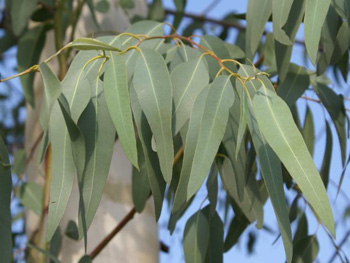
One very effective herbal way to help relieve congestion in the sinuses and in the lungs is to do an herbal steam. This is done by bringing a pot of water to a rolling boil, then removing it from the heat. Add either a handful of crushed, fresh aromatic herbs or 2-4 drops of aromatic essential oil to the pot, then drape a towel over the head and lean over the pot to breathe deeply to inhale the steam. Be careful not to get too close to the steam so as not to burn yourself or your lungs.
For small babies, there is a very helpful modification to this process. Boil the water, add the herbs or oils, then set in the room with the child’s bed or crib so the room will fill with the herbal steam. Be careful to set the pot safely out of reach of the child!
You can repeat this every couple of hours, as needed.
When I was pregnant with my oldest child, I came down with a case of the flu so intense that my sinuses were swelled so much that my upper teeth were loose! And, being pregnant, I was unable to take any medication for it. My dear grandfather told me how to do an herbal steam and it made such a huge difference in how I felt that it became my go-to treatment for congestion and coughs ever since. I also used it for both of my children with great success and have recommended herbal steeaming for many people since.
Recommended herbs for steaming:
Be sure to visit the individual herb pages to learn more about these vital medicinal herbs.
According to recent research studies, another promising herb to help treat coronavirus is elderberry. An article in Elsevier states “…elderberry extracts, have evidence for shortening the duration of influenza by about two to four days and reducing the severity of the infection.”
That’s pretty promising news for anyone already infected with the virus. There isn’t as much research yet into elderberry for treating coronavirus in comparison to research done showing promise for licorice root, but it does look like it may offer hope.
ConsumerLab.com: Elderberry extract has been shown in laboratory studies to inhibit the replication and hemagglutination of human flu viruses, including certain strains of Influenza A and B, and H1N1. Small, preliminary trials in people with the flu suggest that, taken within the first day or so of experiencing symptoms, elderberry shortens the duration of the flu, but more studies are needed to corroborate this.
For people who do choose to try elderberry extract, it’s helpful to know that it appears to be generally well-tolerated. However, people who are allergic to grass pollen may have allergic reactions to elderberry. Never consume raw elderberries, as these contain toxic compounds that can cause nausea, vomiting, dizziness and diarrhea.
Be sure to check out the full page about Elderberry to learn more about it.
Resource Links
|
How You Can Help Support This Site The massive amount of content on this website is made available to readers as a gift. But websites are not free to host or maintain.
By clicking on an affiliate link and placing an order or clicking on an ad, this website receives a small commission which is used to cover hosting and maintenance expenses.
Thank you for your support.
Shop for the Cause.The purchases you make through the Arbor Day Foundation will help support important tree planting efforts around the globe.

|



 A lot has been reported lately about the potential for Psilocybin Mushrooms to help treat major depression. Multiple universities worldwide have been doing research studies into the effects of psilocybin on people with prolonged and profound depression. They have been discovering some amazing things about it.
A lot has been reported lately about the potential for Psilocybin Mushrooms to help treat major depression. Multiple universities worldwide have been doing research studies into the effects of psilocybin on people with prolonged and profound depression. They have been discovering some amazing things about it.
